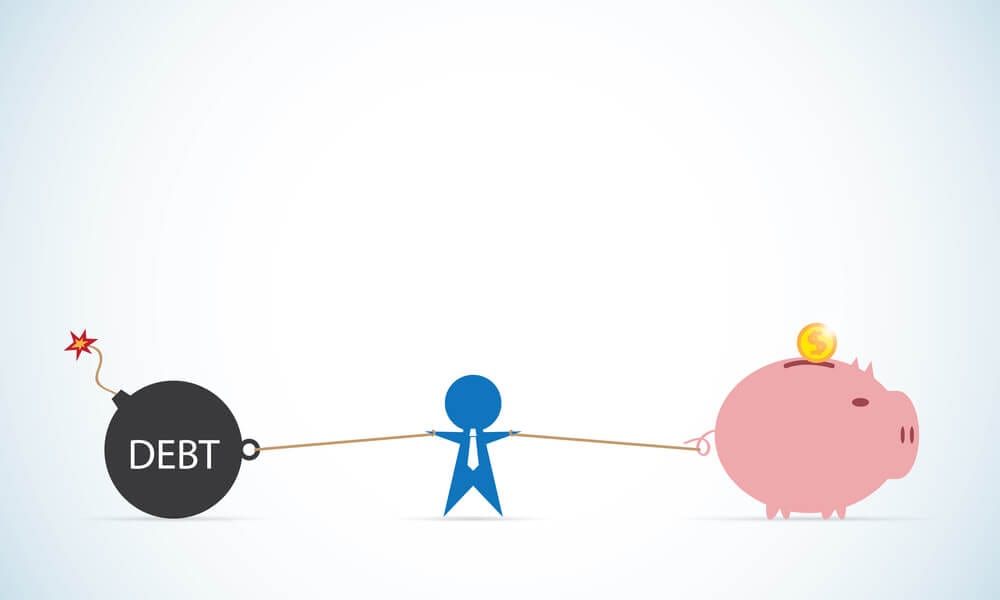How to Prioritize Retirement Savings vs. Debt Payoff
You want to save for retirement, but you’re still getting billed each month for old debts. Can you really justify starting a retirement fund when you have credit card bills, student loans and a mortgage to pay off?
The answer to this common question is: it depends. To address the concern in full, you’ll have to take several factors into consideration.
Your age changes the priority level of a retirement fund. Your income and spending trends dictate how much you can afford to put toward savings or debt each month. Your total amount of debt can help you estimate monthly payments and how long it’ll take to pay your debt entirely. And if you’re planning any life events like buying a house, your credit and spending priorities will change.
Saving for Retirement vs. Paying Off Debt
In some circumstances, it makes more sense to save your money for the future than it does to pay off debts. For some, it may be more fiscally responsible to plan ahead. For others, it may just be reassuring to have some money in the bank.
Consider the following situations, in which it may make sense to save for retirement before paying debts:
- If you’re older and nearing retirement, it might be in your best interest to make a retirement fund your top financial priority.
- If your employer is willing to match your 401(k) contributions, it may be worth it to take this free money, which can make up for the interest you’ll accumulate on unpaid debts.
- If you’re in debt because of a mortgage rather than credit cards, paying down your mortgage may not be a priority. Paying off a credit card creates available credit at your disposal. If necessary, you can use your credit card again to borrow money. But paying a mortgage does not free up additional credit. Further, a mortgage carries a lower interest rate than a credit card, reducing its need for immediacy.
- If your debt is reasonably small, you could continue making the minimum payment and setting aside some money for retirement. With only a small balance remaining on your debts, you’ll be able to wipe it out fairly soon anyway.
- If you feel more comfortable with cash on hand, then you should consider starting a retirement fund sooner rather than later.
For many individuals, it makes more sense to focus on getting out of debt before starting a retirement fund. This typically applies to individuals who are younger or don’t receive retirement savings benefits from their employers.
It may be more prudent to pay off debts before saving for retirement for the following reasons:
- Less debt means lower monthly payments. If you work toward paying off debts and don’t accrue further debt, your expenses should decrease each month. This is a wise move if you’re looking to free up cash in the near future.
- A lower amount of debt can boost your credit score. If you’re planning on buying a home or car, this could make you eligible for better interest rates when you take out a new loan.
- Lower balances equate to less interest. Paying a little extra now will save money in interest long-term.
Your financial situation is yours alone. Your funds and needs won’t be identical to anyone else’s, and your budget and savings plan should be tailored accordingly. But if you’re struggling to set priorities, one financial expert suggests you consider saving and spending extra income in this order:
- First, save an emergency fund equal to your living expenses for three to six months. This is useful if you unexpectedly lose your job, if you have a costly medical emergency or if any other financial hardship comes up.
- Second, put money into a 401(k) or similar retirement fund if there’s a matching contribution of 50 percent or more. The matching contribution will offset any interest fees you accrue on credit card debt.
- Once you’ve reached the maximum 401(k) contribution from your employer, then pay off credit card debts.
- Finally, start saving for other purposes, such as a down payment for a house, a larger contribution to a retirement fund or a college tuition fund for your children.
This is not a foolproof method but can serve as a guideline. If you need individualized advice, speak with a debt specialist or a credit counselor.
What If I Can’t Afford My Monthly Bills?
If you don’t have enough money to cover minimum monthly payments, you may consider dipping into your retirement fund early. While using up savings is never an ideal situation, there is a responsible way to do it.
If you choose to borrow from your 401(k) to pay off debt, you’ll have two options: You can either take a distribution or you can take a loan. In other words, you can permanently withdraw money from your 401(k), or you can borrow from it with the intent of replenishing it when you have the funds to do so.
If you take a distribution before you’re 59.5 years old, there are tax implications. You might have to pay 10 percent tax on any money you remove, and withdrawn funds can’t collect interest down the road.
Borrowing from a 401(k) won’t have these downsides. If you’re still working and you’ll be able to replenish the savings within a few years, borrowing is almost always the better option.
Sources:
- Khalfani-Cox, L. (2012). The Savings vs. Debt Payoff Dilemma: Which to Tackle First? AARP. Retrieved from http://www.aarp.org/money/credit-loans-debt/info-01-2012/savings-versus-debt-dilemma.html
- Khalfani-Cox, L. (2012). The One Time You Can Use Retirement Money to Pay Off Debt. AARP. Retrieved from http://www.aarp.org/money/credit-loans-debt/info-01-2012/use-retirement-for-debt.html
- Mohr, A. (2012). When Paying Off Your Debt Is Actually A Bad Idea. Business Insider. Retrieved from http://articles.businessinsider.com/2012-03-08/news/31135172_1_your-debt-credit-card-card-issuers
- Vernon, S. (2011). Should You Save for Retirement or Pay Off Credit Card Debt? CBS Money Watch. Retrieved from http://www.cbsnews.com/8301-505146_162-39943063/should-you-save-for-retirement-or-pay-off-credit-card-debt/

